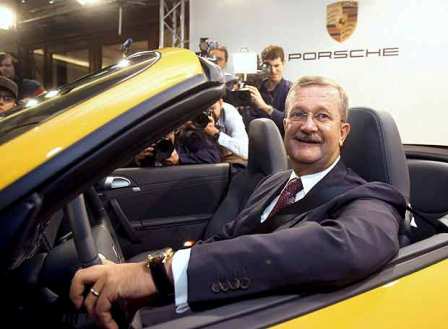No Wonder Porsches Cost So Much!
Think the $10.2m salary and bonuses Rick Wagoner took home in 2006 is outrageous? That's chump change– at least compared to what Business Times reports Wendelin Wiedeking reeled in last year. Porsche's president finished the year with his bank account €70 million healthier than when it started. That's $103.7m folks. For one year. The fat cats on the management board shared in the bonanza, splitting €113 million ($166.9m) between themselves. While it's true Porsche is the world's most profitable auto maker, less than half of its profits come from making autos. While the company reported €5.86 billion ($8.65b) of profit this month, €3.59 billion ($5.3b) came from stock option profits– most of which are "paper" profits on options to purchase more of VW. Porsche finance director, Holger Härter, describes the monetary machinations as "options on options on options" but denies there's anything shady going on.
More by Frank Williams


































Comments
Join the conversation
Katie, I'm not spouting some zany new crackpot theory, this is just basic economics. If you can boost your profits by $2 by spending $1, you'd be stupid not to do that (unless better yet you only need to spend a half dollar, or nothing at all -- which is what your employer did). This is investing: you put £100 in the bank so that at the end of the year you'll have £105. That beats stuffing it into your pillow case and making no interest at all. Economists just formalize this by saying a firm should increase output until the marginal cost equals the marginal revenue -- that's how you maximize profits. If they don't do that, they're leaving additional profits on the table for no good reason. Now I'm not saying actual companies can do this efficiently with all their employees. In dealing with a lot of rank-&-file employees there are a lot of messy real-world issues, such as 1) it's often difficult to really identify and track exactly how much value individuals create 2) even if you can, you must consider the problems of distorting the payscale to benefit one person, and the personnel problems that may cause (such problems add to the cost), 3) how do you reward employees for a non-repeatable one-time improvement? etc. But the rules are different for high-end execs with a lot of organization & political power in a firm, and they do stand a chance of being well rewarded. That's just the way it is if you want to be able to hire people with those very rare abilities. (And they are rare, no matter how much we dislike a lot of them). Because a person in that position may actually be able to accomplish something that does increase revenues and profits by billions of dollars, and they can sit down with the board of directors and make their case for what they're worth.
Kevin, you're not fooling anybody with your false Wall Street "Greed is Good" logic. The reason top executives are overpaid so hugely is because they control the purse strings, along with the board of directors who also are almost always overpaid. Stanley O'Neal, the man who presided over the loss of several billion dollars at Merrill Lynch until he was fired a few months ago, is walking away with $160 million dollars in pay this year. Because like most CEO's he had the board of directors in his pocket. That's just this year, it doesn't include prior years pay. Google him. How does that fit into your executive compensation dogma?
Porsche is profitable because nothing they make is cheap. Couple that with a seemingly endless demand for their product and it's easy to see why they make so much money. How much does it really cost to make a 911 Turbo? I'm guessing that they have gross margins of well over 50% on that model, something that's just not possible on models that sticker at under $25K. That's also why I'll probably never buy a new Porsche. I just can't justify the premium no matter how good the car is. There are too many less-expensive alternatives.
The correct salary comparison is with private equity or hedge funds rather than manufacturing industry as most of the 70M euro is a bonus based on exceptional trading profits earned for shareholders: 3.6 Billion euro in one year. Wiedeking's actual salary is 7M euro. Much less than the ceo of a similar company would get in the US. "Porsche profits by CFO's hedges" FT: http://tinyurl.com/2b2g7f